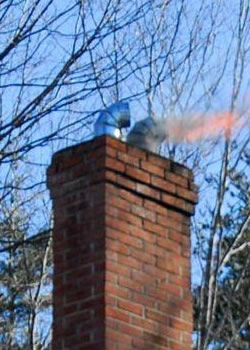Get interesting information about How To Know If You Have A Chimney Fire, this article is specially curated for you from various reliable sources.
Imagine cozying up by a crackling fire, lost in the warmth and ambiance. But what if that cozy moment suddenly turns into a nightmare? Chimney fires can be a devastating hazard, and it’s crucial to recognize the signs before it’s too late. In this comprehensive guide, we will delve into the telltale symptoms of a chimney fire, empowering you with the knowledge to act swiftly and protect your home and loved ones.

How To Know If You Have A Chimney Fire
Before we proceed, let’s address the Elephant in the room: how does a chimney fire start? The most common culprit is creosote, a highly flammable substance that accumulates in chimneys over time. When exposed to heat, creosote can ignite, creating a dangerous blaze. So, if you’ve been enjoying frequent fires, it’s time to schedule a chimney cleaning to minimize the risk.
Whispers of Danger: Detecting the Subtle Signs
Chimney fires often announce their presence through subtle clues that we might overlook. Here are some signs that warrant immediate attention:
- Loud crackling or popping noises: As the fire intensifies, the flames create an unusually loud crackling or popping sound, unlike the gentle crackle of a controlled fire.
- Excessive smoke or flames: Noticeably more smoke and flames erupting from the chimney may indicate a fire within.
- Extreme heat: The chimney will emit intense heat, which can be felt from a distance.
Alarming Symptoms: When the Fire Rages
If you suspect a chimney fire, look for these alarming signs that indicate the fire has escalated:
- Roaring flames: The fire will grow louder and produce roaring flames that shoot out of the chimney.
- Black or brown smoke: The smoke will turn black or brown, indicating the presence of creosote burning.
- Ember sparks: Embers will be carried by the wind and may land on nearby trees or structures.
The Aftermath: Assessing the Damage
Once the fire has been extinguished, it’s essential to inspect your chimney and assess the damage. Here’s what to look for:
- Cracked or broken chimney: The intense heat can cause cracks or even break the chimney.
- Damaged chimney liner: The liner, which protects the chimney from heat, may need to be replaced.
- Burnt insulation: The insulation around the chimney could be damaged, compromising its fire resistance.
Expert Advice: Preventing and Addressing Chimney Fires
Prevention is key when it comes to chimney fires. Here are some expert recommendations:
- Regular chimney cleaning: Have your chimney inspected and cleaned by a professional chimney sweep at least once a year.
- Proper firewood: Use seasoned hardwood that has been cut and split to the appropriate size.
- Fireplace safety: Never leave a fire unattended, and keep flammable objects away from the fireplace.
In the event of a chimney fire, follow these tips:
- Call the fire department immediately: Don’t attempt to extinguish the fire yourself.
- Evacuate the house: Get everyone out of the house and stay away from the chimney.
- Ventilate the house: Open windows and doors to remove smoke and fumes.
FAQs: Addressing Common Concerns
Q: Can I use a garden hose to put out a chimney fire?
A: No, do not use water to extinguish a chimney fire. Water can cause the fire to spread and create steam, potentially damaging the chimney.
Q: How long does it take for a chimney fire to spread?
A: Chimney fires can spread rapidly, especially if there is creosote buildup. It’s best to call the fire department immediately if you suspect a chimney fire.
Conclusion
Knowing how to detect and prevent chimney fires is crucial for protecting your home and family. By being vigilant, taking preventive measures, and acting swiftly in case of an emergency, you can minimize the risk of this dangerous hazard. For further information and expert guidance, don’t hesitate to consult with a qualified chimney sweep. Remember, chimney safety is a matter of utmost importance. Are you interested in learning more about chimney fire safety? Let us know in the comments below!
How To Know If You Have A Chimney Fire

Image: www.youtube.com
An article about How To Know If You Have A Chimney Fire has been read by you. Thank you for visiting our website, and we hope this article is beneficial.